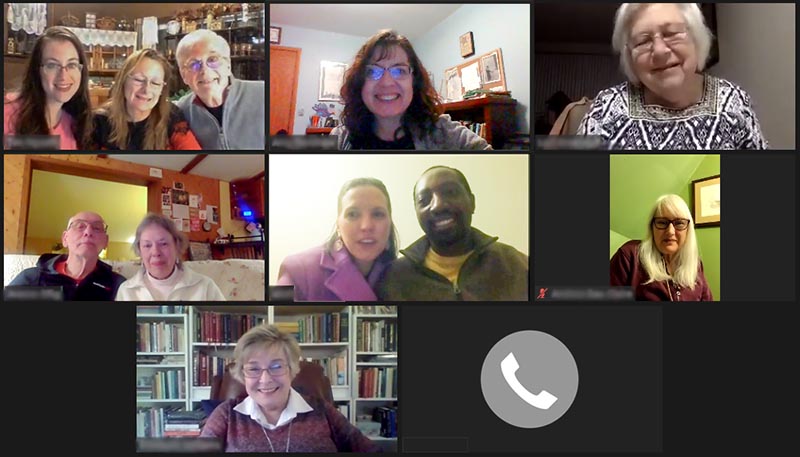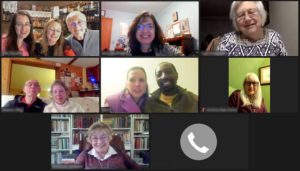



By Yasmin Roshanian
Communities across the country are continually learning how to use virtual gathering spaces to foster bonds of spirituality and friendship through prayer and conversation. Here are glimpses of gatherings in two localities that are guided by a vision of justice.
Los Angeles area: Solidarity in justice
Bahá’ís in the suburbs west of Los Angeles have maintained a steady space for fellowship through “Solidarity in Solitude,” a regular online devotional gathering that has attracted participants from many faiths and racial backgrounds.
In parallel, a discourse space on social justice encourages deeper conversations on racial justice. “These two weekly events have become interconnected,” says Sima Mobini, a Bahá’í in the area. “At the end of the devotional, we invite everyone to the race conversation, and at the end of the race conversation, we invite everyone to the devotional.”
The tandem effort had its beginnings in spring 2020, early in the pandemic, when a group of area Bahá’ís developed the videoconferenced devotional. “We felt that there was a growing consciousness regarding the interconnectedness of all of humanity,” as well as a need for people to reflect together, says Hamid Rastegar, one of the organizers. This regular gathering is “a safe space, and people are encouraged to read writings from all faiths and all philosophies,” he says.
Before long, the group saw a need to talk deeply about racial inequities, and after the killing of George Floyd in Minneapolis a participant asked to devote a session to social justice.
Stephen Barnes, a Bahá’í in the group, says he consulted with Rastegar and Mobini, and they decided “to invite the participants there to a one-time conversation about race” in addition to the regular devotional.
Barnes, who acknowledges he was feeling a deep sense of frustration with the scope of racial inequities in society, was asked to facilitate the conversation. Though it was first intended as a single meeting, Barnes says there was a desire to keep the conversation going each week.
These online spaces often attract more than 50 participants every week, including Bahá’ís, their friends and those eager to contribute to the racial justice dialogue. Robust conversations have led to friendships.
“In the discourse space, we are introducing the principles of the Bahá’í Faith and applying them in the context of areas in which we have common interest,” Barnes says. “We are tapping into what is unique about our Faith and our principles.”
A number of participants in these dual spaces have additionally begun taking part in study circles. “We’re learning as we go,” says Barnes. “And we’re careful to treat these conversations as continued points of unity.”
Eau Claire, Wisconsin: Erasing barriers
Interfaith dialogues have opened opportunities for Bahá’ís in Eau Claire, Wisconsin, to build networks of friendship that have helped them organize devotional and discussion gatherings that are flourishing.
“We have been involved in quite a large interfaith group in Eau Claire,” says Ruth Peterson, “and we have been fortunate to have developed such wonderful relationships there.”
Amy Renshaw adds, “We’ve met friends from all different Christian denominations, Muslim friends, a friend from a Buddhist community, Jewish friends … we have often participated in [interfaith] events, and we invite the people that we’ve met to our monthly devotionals.”

While the wider interfaith group meets quarterly, the Bahá’í-organized devotional gathering is held once a month, and its momentum has grown over the past few years. “We just shifted to a Zoom meeting once the pandemic started,” and the connections continued, says Renshaw.
In addition to this steady interfaith devotional, she says, they have opened a space for social justice that has led to impactful dialogues. “We were inspired by other communities that created a space to discuss racial justice,” she says. “We begin with prayer and devotions before opening the floor for conversation.”
Acknowledging the sensitivity required to maintain a dialogue on race, Renshaw says, the facilitators rely heavily on the Bahá’í writings to guide an elevated conversation. “The vision of the oneness of humanity sets the tone,” she says.
Similarly, participants are expanding their knowledge together on the prevailing nature of racism. “A few of us are taking a course on white privilege,” says Renshaw. “We’re all sharing with each other what we’re learning and what we’re reading.”
Eau Claire is a predominantly white community, Peterson says, and “we’re really using this time to educate ourselves.” Still, Peterson and Renshaw say the low level of diversity doesn’t deter them from working to build a more spirited and inclusive community.
“We’re actively getting involved with other groups and organizations in our community who are focused on inclusivity,” says Renshaw. “We are staying connected and making connections with people of all backgrounds.”


![]()
![]()
Whether you are exploring the Bahá'í Faith or looking to become an active member, there are various ways you can connect with our community.
Please ensure that all the Required Fields* are completed before submitting.